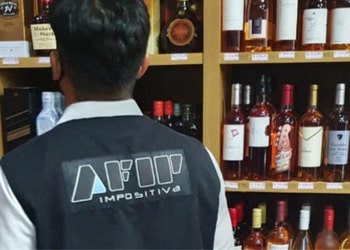While contraband has boomed at the Argentina-Brazil border during the COVID-19 pandemic, wine seems to have been in particularly high demand, with one high-profile murder being linked to its smuggling.
In mid-May, lawyer Juan María López was gunned down in Bernardo de Irigoyen, an Argentine border town near Brazil. Police found a number of receipts inside the vehicle showing that López was involved in transporting bottles of wine illicitly from Buenos Aires into Brazil through Bernardo de Irigoyen, according to local newspaper El Territorio.
The police stated the two suspects likely crossed the border and fled into Brazil. Investigators believe López was killed due to his links to wine contraband.
This was not the first murder in Bernardo de Irigoyen linked to the local contraband trade.
SEE ALSO: GameChangers 2020: How Black Markets Became the New Normal
The case comes amid record seizures of wine at the border during the pandemic. In March alone, Argentina and Brazil confiscated 80,000 bottles of Argentine, Chilean, German, Italian and Spanish wine in the border towns of Bernardo de Irigoyen, Dionisio Cerqueira and Barracão as part of Operation Dionysus, which targeted wine trafficking.
From January to July 2020, Brazil seized 35,000 bottles, up from 22,000 bottles in all of 2019. And criminals are resorting to desperate measures to protect their cargo. The most memorable seizure came after one perpetrator led authorities on a wild chase. Starting in Brazil, he evaded police in a Fiat Uno, rammed into border markers between Argentina and Brazil, and then crashed into a sidewalk before fleeing. In April 2020, another criminal tried to thwart authorities by attaching a fog machine to their vehicle that would allow them to escape as police were temporarily blinded.
To further evade detection, fake labels have long been placed onto bottles and documentation, masquerading cheap wine as more expensive produce.
InSight Crime Analysis
Even though contraband grew significantly during the pandemic, the increase in wine contraband in the Argentina-Brazil border region demonstrates just how developed and sophisticated this criminal economy is.
Brazil has worked hard to curb the illegal wine market, making larger and more frequent seizures in recent months. Operation Horus, an ongoing initiative focused on stopping all types of contraband from entering Brazil through its shared border with Argentina and Paraguay, made so many seizures of illegal wine that a more focused operation was created, named Dionysus. This joint cross-border operation seized 107,000 bottles of wine by mid-March, according to a Brazilian government report.
While wine contraband is most prominent in Argentina and Brazil’s border region, Bolivia and Colombia have had their own seizures as well. Earlier this month, Colombian authorities announced they had decommissioned 1,514 liters of various types of alcohol, including wine. In November 2020, 60 tons of smuggled wine, beer and liquor were dumped out in Bolivia’s Tarija department. Then in June 2020, Bolivian Customs also found dozens of cases of wine hidden under bags of onions in Santa Cruz. Plenty of Chilean wines also flow illegally across the border into Argentina.
Fine wine is far from the only type of alcohol on the black market. Liquor, mostly homemade moonshine, makes up 92 percent of illicit alcohol in Latin America, according to a 2018 Euromonitor International report.
The deadly effects of this moonshine were felt during the pandemic.
Various Latin American governments temporarily implemented restrictions on the purchase of alcohol at the beginning of the pandemic to prevent large gatherings. As a result, black market alcohol was purchased, and the adulterated product has caused hundreds of deaths across the region.

